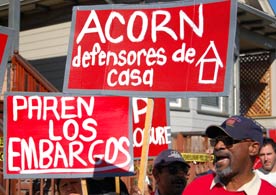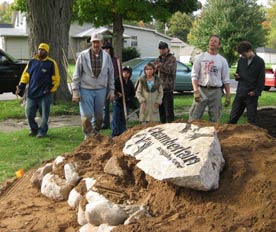
© Jacob Ruff, Jacobruff.com, used with permission
Claire Haas, ACORN’s North California organizer, arrived on her bike near sunrise wearing two sweatshirts and a red jacket to stop the eviction of Eddie and Martha Daniels by the Alameda County sheriff.
The cold air stung her fingers, but by 6 a.m., and despite the weather, more than 30 members of ACORN joined Haas in front of the Daniels’ West Oakland residence armed with prayers, cell phones, and coffee.
The Daniels family, known in the community for their volunteer work at the homeless shelter at the local church, had always paid the rent on time. But their landlord, unbeknown to them, had failed to pay the mortgage on the house they rented and in 2008 Citibank, the mortgagee, foreclosed. Because of a successful campaign waged by ACORN in 2001, Oakland passed a Just Cause for Eviction Ordinance, which gave the Daniels the right to stay in their home after a foreclosure.
The Daniels family attempted to purchase the house and, at the advice of Citibank’s real estate broker, they waived their rights under the eviction law in order to facilitate the purchase. While they struggled to get a mortgage, Citibank began the eviction process. Following a court order, the sheriff scheduled a Feb. 4 eviction and the Daniels family was set to become another statistic in the national foreclosure catastrophe.
Roughly 2.3 million families faced foreclosure in 2008, and economists predicted 2009 would be worse. Credit Suisse predicted that there would be between 8 million and 9 million foreclosures in the next four years, at a potential cost to the economy of $702 billion. Oakland had the country’s 10th-highest foreclosure rate for a metropolitan area. So millions of homes were lost while banks got billions of dollars in government bailout money. ACORN understood that a successful economic recovery that helped the working poor would be impossible without addressing rampant foreclosures.
Pushing Back Against Eviction
Martha and Eddie Daniels did not want to be another statistic. In January 2009, they decided to attend an ACORN Foreclosure Fighters meeting. Their story prompted Annie McKinzie, an East Oakland resident who had lost her home six months earlier, to speak about her neighborhood, with its 150 homes in foreclosure. Many of the properties had all the tell-tale signs of the foreclosure crisis: foot-high grass, properties littered with trash and old mail, and houses-cum-havens for drug dealers. “We can’t let this happen to the Daniels,” she said. After explaining to meeting attendees what the sheriff does in an eviction, ACORN members formulated the plan to stop the Daniels’ eviction.
Days before the scheduled eviction, a delegation of ACORN members visited a local Citibank office urging its officers to stop the eviction. They delivered a “Thank You in Advance” card and asked the local bankers to send it to the executives in charge of making the decision. ACORN Foreclosure Fighter President Merlyn Amaya convinced a radio station to broadcast the eviction live from the Daniels’ home.
The day of the eviction the station began broadcasting live updates on the air every 15 minutes telling what had happened and encouraging listeners to phone the sheriff. Demonstrators and radio listeners flooded the sheriff’s office with calls urging compassion and forbearance of the scheduled eviction.
Late in the morning, the crowd grew and many neighbors came out to observe and join in to lend their support singing and chanting. “They are good neighbors and always helpful,” said neighbor Khalil Louis to the onlookers. “We need to help them, because they would do the same for us.”
After more than 50 ACORN members, neighbors, and allies came to physically oppose the eviction, a spokesman for the sheriff’s office called the Daniels family saying they would not evict that day, and requested that people stop calling their office. Martha Daniels rushed over to Amaya, hugged her and almost fainted in her arms. Later that month, Martha Daniels and Amaya would be elected the co-chairs of the Foreclosure Fighters chapter in Oakland. Maud Hurd, ACORN’s president, said in a press release, “This shows the power of communities coming together to fight back against the foreclosures that are taking our homes and ruining our neighborhoods.”
Later in February, ACORN’s board of directors launched a national effort modeled on what happened in Oakland. Called ACORN Home Defenders, it was aimed at keeping families in their homes and putting pressure on elected officials to address this root cause of the economic collapse.
The campaign echoed the sentiments of leaders like Ohio Congresswoman Marcy Kaptur who said, “Stay in your homes. If anybody out there is being foreclosed, don’t leave.”
ACORN Helping in Foreclosure
ACORN engaged in myriad initiatives to help people facing foreclosure:
- The ACORN Housing Home Equity Loss Prevention program (HELP) helped prevent housing foreclosures for 8,000 homeowners by obtaining favorable mortgage changes, and at the time of this writing, was in the process of helping 18,000 more save their home through a loan modification process.
- In California, ACORN sponsored a bill to protect consumers from rip-offs by mortgage brokers, including, for example, prohibiting them from steering borrowers to loans that are more costly than other loans they qualify for. The organization worked for two years to ensure its passage, despite the opposition of the powerful bankers and brokers. California Gov. Arnold Schwarzenegger signed it into law.
- ACORN was pivotal in protecting and expanding affordable housing in New Orleans after hurricane Katrina. Even HUD officials in the George W. Bush administration viewed ACORN’s nonprofit housing programs as among the best in the country.
- ACORN led a successful effort to save New York City’s Starrett City housing complex, the nation’s largest federally supported working-class apartment complex, from being sold to a housing speculator.
Of course, the Republican Party and the right wing media posed a threat to everything ACORN does. From Glenn Beck’s assertion that ACORN’s founders were inspired by a “strategy” to “transform” the United States “into a socialist-Marxist state” to the hidden camera incident, where conservative activists James O’Keefe and Hannah Giles began visiting ACORN offices with a hidden video camera and trying to lure ACORN staff into providing advice to a prostitute about buying a house for the purposes of operating a brothel.
What wasn’t reported: To further sensationalize the tape, O’Keefe wore a dress shirt and khakis while he was secretly videotaping in the ACORN offices, but then taped himself dressed as a cartoonish pimp and spliced that footage into the tape, making it appear that ACORN workers were talking to what appeared to be a pimp straight out of central casting.
ACORN’s employees did not create client files or bills, file tax returns, sign or submit loan documents, or arrange bank loans for Giles and O’Keefe, though you’d never know it by watching the videotapes aired on Fox in the days that followed the incident. Those tapes appeared to implicate ACORN’s staff in four other offices in giving advice to the make-believe prostitute.
After that, the floodgates opened, and The New York Post, CNN, and soon the rest of the mainstream media picked up on the story. There was a lack of uniformity in ACORN’s hiring process, as well as a weakness in staff training and supervision of their service work, but no evidence existed indicating ACORN staff did anything illegal or that the filmed employees typified the organization’s staff rather than being a few “bad apples.”
And yet, the damage was done and the political fallout, swift and severe, began: the U.S. Census Bureau dismissed ACORN as one of its 80 nonprofit partners and the U.S. House of Representatives voted, in a show of bipartisanship rare these days, to strip federal funding from ACORN, blocking HUD from giving it grants. Congress assumed the truth of the Republican allegations against ACORN without troubling to confirm them or even ask ACORN to present their side of the story.
All Quiet from One-Time Supporters
With the exception of a handful of Democrats in the House and Senate, including New York Rep. Jerrold Nadler, who branded the Defund ACORN Act a “bill of attainder” and an unfair, punitive act by Congress, we’re left to wonder why so many Democrats abandoned ACORN? In the frenzied atmosphere created by the media, Democrats (with some aforementioned exceptions) ran to put as much distance as possible between them and the “corrupt” outfit portrayed on TV. Most members of Congress represent middle class and upscale constituents who had no first-hand knowledge of ACORN; they only knew what they saw on TV, heard on the radio, read in the newspaper, or gleaned from off-hand comments at work, at church, or at the mall, and didn’t know what ACORN had accomplished. For Obama, defending ACORN would have played into the Republican strategy of diverting public attention away from his legislative agenda, that is, fixing the economy, regulating the banking industry, passing health care reform, and addressing climate change.
Many foundations that had praised and funded ACORN’s work in the past, fearful that their grant money may be misused or that the controversy might lead to an attack by the organized right wing, either pulled the plug on ACORN or did not renew grants.
The mainstream press, particularly The Washington Post, contributed to the feeding frenzy. Gathering together every rumor and allegation ever made against ACORN, The Post made several factual errors. For example the reporters located the attacks by conservatives as beginning in 2008, when the attacks go back some 25 years. Like CNN and other members of the purported “liberal press,” several Post articles failed to introduce their stories by explaining this long conservative campaign to smear and vilify the group using any means necessary including lying and exaggeration. The Post reporters left the impression ACORN was funded only by government grants and foundations, leaving out that ACORN was a dues-paying organization.
ACORN tried to counter the attacks. In October, ACORN engaged Scott Harshbarger, the former Massachusetts Attorney General and former president of Common Cause, to investigate the videotape incident and, more important, to recommend and implement necessary management reforms, but by November 2009 ACORN was financially on its heels. Conservative Republicans kept up the attack, and some of ACORN’s partners in the business community, such as Bank of America, Citibank, and even SEIU, cut off financial support pending Scott Harshbarger’s investigation.
The Fight Back
Some liberals and progressives had quickly come to ACORN’s defense. In September, Daily Kos, a progressive blog, defended ACORN and condemned the congressional vote as a threat to free speech. In several cities ACORN’s supporters organized rallies, issued statements, and tried to counter the distortions in the media.
ACORN filed suit against O’Keefe and Giles for violating Maryland’s legal requirement of two-party consent to create sound recordings when they visited ACORN’s office in Baltimore. The multimillion dollar suit seeks damages from conservative activists including a columnist who posted the videos on his website. On Oct. 1, a progressive coalition that included the NAACP, Leadership Conference on Civil Rights, Center for Community Change, and the Alliance for Justice, released a statement supporting ACORN. In that statement, Ben Jealous, president of the NAACP, said, “We are deeply troubled by the despicable ‘railroading’ strategy being employed by anti-democratic zealots to bring down [ACORN] and end their invaluable service to poor and disadvantaged communities.” But only one newspaper picked up the story.
On Oct. 23, a coalition of two-dozen community organizers, labor leaders, and clergy rallied in Watts in support of ACORN. “It’s a witch hunt after a segment of the progressive populations,” Paul Zimmerman, director of the California Association of Non-Profit Housing, said. In November, the progressive filmmaker Robert Greenwald’s Brave New Films released an online campaign in support of ACORN.
On Nov. 12, the Center for Constitutional Rights filed a lawsuit challenging Congress’s defunding of ACORN, charging Congress with violating the bill of attainder provision in the U.S. Constitution (a bill of attainder is something that singles out a group or individual for punishment without a trial, and is prohibited), the Fifth Amendment right to due process, and the First Amendment right to freedom of association by targeting affiliated and allied organizations.
Veteran foundation consultant and senior fellow in Georgetown Public Policy Institute’s Center for Public and Nonprofit Leadership, Pablo Eisenberg, while also criticizing ACORN’s past errors, questioned why more people had not come to the organization’s defense in a piece published in The Chronicle of Philanthropy:
“In the assault on ACORN, no lies have been spared, no accusations tempered by reason, and no acknowledgment has been made of the enormous good ACORN has done over the years. Behind the attacks are a deep hatred of liberals and progressives—especially those in the Obama administration—and a lack of concern and respect for poor and minority constituencies.”
In December 2009, facts exonerating ACORN began to emerge. On Dec. 7 an independent report by the former Attorney General Scott Harshbarger cleared ACORN of any illegal conduct. The report found:
“While some of the advice and counsel given by ACORN employees and volunteers was clearly inappropriate and unprofessional, we did not find a pattern of intentional, illegal conduct by ACORN staff; in fact, there is no evidence that action, illegal or otherwise, was taken by any ACORN employee on behalf of the videographers.”
His report also noted that the videos were doctored and misleading.
The report reinforced criticism of the mainstream media’s handling of the story, including the way CNN played the “prostitution scandal” videotapes over and over again. As Joe Conason reported, the ACORN tapes amounted to “an exercise in propaganda, not journalism.”
But the mainstream press continued to botch the ACORN story. For example, the Associated Press story on the Harshbarger Report published in The Washington Post didn’t mention that the conservative videographers rebuffed attempts by Harshbarger to interview them and refused to permit him to review the unedited tapes so he could compare the raw footage with versions that were released. Most major news outlets did not even mention the report.
Five days later, on Dec. 12, federal judge Nina Gershon blocked U.S. officials from enforcing the funding ban on ACORN. She ruled that Congress had violated the Constitution’s ban on bills of attainder. ACORN lawyers quoted several Republicans making unsubstantiated accusations about ACORN being a criminal organization that deserved to be punished.
Soon after Harshbarger refuted the charges of financial wrongdoing and voter fraud against ACORN, a nonpartisan Congressional Research Service report (CRS) released on Dece. 22 found no evidence of voter fraud associated with ACORN and “no instances in which ACORN violated the terms of federal funding in the last five years.” Moreover, the report found that the two conservative activists who secretly videotaped conversations with ACORN workers and distributed those recordings on the Web without their consent violated laws in Maryland and California. CRS also noted that as of October 2009, ACORN had been subjected to at least 46 federal, state, and local investigations with only 11 still outstanding. Only one state, Nevada, had brought charges against ACORN under an ambiguous law that prohibited paying staff to register voters.
But it was too late. ACORN had been defamed and the positive news failed to undo the damage.
Losing ACORN
For the working poor, losing ACORN is tragic. With a Democratic Congress and the election of Obama, ACORN’s really modest operation—run out of well-worn offices, using donated computers and torn furniture, paying low salaries for long hours—should have been flexing its muscles, providing a louder voice for the less powerful. In this hopeful political moment, this effective group had its capacity to give voice to the poor compromised.
People concerned about poverty in the United States can ill afford to lose ACORN. Few organizations recognize how hard it is to build membership-based community organizations among the poor—much less one that has lasted four decades. Its organizing—door-knocking in low-income neighborhoods to identify problems and recruit members —is one of the best training grounds for new young organizers, and ACORN increasingly has recruited its staff from among the ranks of its low-income minority members.
Meanwhile ACORN members like Oakland’s Martha Daniels continue the fight to stop the foreclosures. After securing a job helping young people in an intensive job skills training program, she became a leader of the California Home Defenders. Her husband Eddie remained active at their church, and led bible studies each week. The Daniels family is in the process of purchasing a home through the Oakland Community Land Trust—another ACORN project. According to Urban Strategies Chief Executive Junius Williams, the trust buys abandoned homes, rehabilitates them, and then sells the houses (but not the land) at low-interest loans to members of the community. By maintaining ownership of the land, the land trust will keep the prices of the homes affordable, and it continually raises money to buy up abandoned properties. “Our community land trust is just one of the strategies that ACORN and Urban Strategies are pursuing,” Williams said. “First we try to keep people from getting into foreclosures.”
With the increased attacks against ACORN, members of ACORN’s California chapter decided to build a new community organization. On Jan. 13, 2010, ACCE (Alliance of Californians for Community Empowerment) announced its formation. The organization, though brand new, legally independent, and distinct from ACORN in key ways, seeks to carry on the mission and build upon the best aspects of the ACORN organization in California.
Martha and Eddie Daniels are now active community leaders—they are founding members of ACCE and frequently have meetings of their neighbors at their home to discuss housing jobs, education, and other community concerns.





Comments